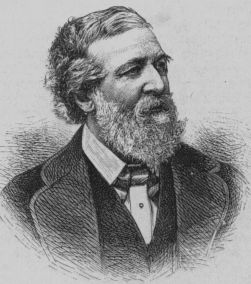Frases célebres de Robert Browning
“Parecemos tan libres y ¡estamos tan encadenados!”
Fuente: El amigo de todos: 4,850 pensamientos clasificados y 700 refranes explicados. Compilado por Victor Quintanilla Young, Vilma Elvira C. de Quintanilla.
“Ama de verdad un solo día y el mundo habrá cambiado.”
Fuente: Cabestrero Rodríguez, Teófilo. Jesús, el hombre que ama como Dios. Editorial Desclée De Brouwer, 2015. ISBN 9788433037282. https://books.google.es/books?id=4svyDQAAQBAJ&pg=PT37&dq=Ama+un+solo+d%C3%ADa+y+el+mundo+habr%C3%A1+cambiado&hl=es&sa=X&ved=0ahUKEwibqpqElK_gAhWOlhQKHYS4AAUQ6AEIMjAC#v=onepage&q=Ama%20un%20solo%20d%C3%ADa%20y%20el%20mundo%20habr%C3%A1%20cambiado&f=false
“Cuando la lucha del hombre empieza dentro de sí, ese hombre vale algo.”
Fuente: Palomo Triguero, Eduardo. Cita-logía. Editorial Punto Rojo Libros,S.L. ISBN 978-84-16068-10-4. p. 154.
Fuente: Eusebio, Sebastián Arribas. Enciclopedia básica de la vida. Cultivalibros. 2010. ISBN 978-84-99233-42-0. p. 37.
Frases de hombres de Robert Browning
“El hombre busca su bien a costa del mundo entero.”
Fuente: Amate Pou, Jordi. Paseando por una parte de la Historia: Antología de citas. Editorial Penguin Random House Grupo Editorial España, 2017. ISBN 9788417321871. p. 56.
“La culpa la tiene sólo el tiempo. Todos los hombres se tornan buenos, pero ¡tan despacio!”
Fuente: Hernández Bitor, Miguel Ángel. Confesiones desde el otro lado. Editorial Visión Libros, 2006. ISBN 9788498213935. p. 7. https://books.google.es/books?id=IPo6DwAAQBAJ&pg=PA7&dq=La+culpa+la+tiene+s%C3%B3lo+el+tiempo.+Todos+los+hombres+se+tornan+buenos,+pero+%C2%A1tan+despacio!&hl=es&sa=X&ved=0ahUKEwitzvHdma_gAhUS1uAKHRc5C2EQ6AEIMzAC#v=onepage&q=La%20culpa%20la%20tiene%20s%C3%B3lo%20el%20tiempo.%20Todos%20los%20hombres%20se%20tornan%20buenos%2C%20pero%20%C2%A1tan%20despacio!&f=false
“Lo que ennoblece al hombre no es un acto, sino un deseo.”
Fuente: Ortega Blake, Arturo. El gran libro de las frases célebres. Editorial Penguin Random House Grupo Editorial México, 2013 ISBN 978-60-7311-631-2.
“Yo sostengo que un hombre
Tiene que luchar hasta el final
Por el precio
En que ha fijado su vida.”
Fuente: Vallvey, Ángela. El arte de amar la vida. Kailas Editorial, 2015. ISBN 9788416023776 https://books.google.es/books?id=9OedCwAAQBAJ&pg=PT109&dq=Yo+sostengo+que+un+hombre+ha+de+luchar+hasta+el+final,+por+el+precio+en+que+ha+fijado+su+vida&hl=es&sa=X&ved=0ahUKEwj5187Znq_gAhUIWxoKHRy7DNUQ6AEIKDAA#v=onepage&q=Yo%20sostengo%20que%20un%20hombre%20ha%20de%20luchar%20hasta%20el%20final%2C%20por%20el%20precio%20en%20que%20ha%20fijado%20su%20vida&f=false
Robert Browning Frases y Citas
“El que escucha música siente que su soledad, de repente, se puebla.”
Fuente: León, José Vicente; Capella, Rebeca. Una música para cada día: 366 días de acontecimientos musicales. Editorial El Regalo Musical, 2014. ISBN 9781291825688. p. 128. https://books.google.es/books?id=aYilBAAAQBAJ&pg=PA128&dq=El+que+escucha+m%C3%BAsica+siente+que+su+soledad,+de+repente,+se+puebla&hl=es&sa=X&ved=0ahUKEwiXvJjjmK_gAhXB2OAKHXxbCg4Q6AEILTAB#v=onepage&q=El%20que%20escucha%20m%C3%BAsica%20siente%20que%20su%20soledad%2C%20de%20repente%2C%20se%20puebla&f=false
“La ignorancia no es tal, sino pecado.”
Fuente: Mackay, Alan L. Diccionario de citas científicas: la cosecha de una mirada serena. Volumen 1 de Proyecto Didáctico Quirón, Ciencias, Tecnología y Sociedad. Ediciones de la Torre, 1992. ISBN 9788479600242. p. 71. https://books.google.es/books?id=PvcAulSTG8gC&pg=PA71&dq=La+ignorancia+no+es+tal,+sino+pecado.+Robert+Browning&hl=es&sa=X&ved=0ahUKEwi57_Chmq_gAhWy1uAKHcMmBPIQ6AEIKDAA#v=onepage&q=La%20ignorancia%20no%20es%20tal%2C%20sino%20pecado.%20Robert%20Browning&f=false
“Las cadenas que más nos oprimen son las que menos pesan.”
Fuente: Torres, Gabriela. Aprendiendo a vivir libre: O aprendiendo a no depender. Editorial Palibrio, 2012. ISBN 9781463320119. p. 27. https://books.google.es/books?id=jIoToGRFyWkC&pg=PA27&dq=Las+cadenas+que+m%C3%A1s+nos+oprimen+son+las+que+menos+pesan.+Robert+Browning&hl=es&sa=X&ved=0ahUKEwjm4LXNm6_gAhWvDmMBHfBxDWYQ6AEIKDAA#v=onepage&q=Las%20cadenas%20que%20m%C3%A1s%20nos%20oprimen%20son%20las%20que%20menos%20pesan.%20Robert%20Browning&f=false
“Señor, no sigas produciendo gigantes. Eleva la raza.”
Fuente: Hinojosa Canedo, Benjamín. Quienes somos: quién es quién en Bolivia. Editorial Secretaría Nacional de Cultura, 1999. p. 16.
Robert Browning: Frases en inglés
Abt Vogler, ix.
Bartlett's Familiar Quotations, 10th ed. (1919)
“He who did well in war just earns the right
To begin doing well in peace.”
Luria, Act ii.
Bartlett's Familiar Quotations, 10th ed. (1919)
“It is so horrible,
I dare at times imagine to my need
Some future state revealed to us by Zeus”
From Cleon; regarding death and afterlife
Dis aliter visum; or, Le Byron de nos Jours.
Bartlett's Familiar Quotations, 10th ed. (1919)
“Every joy is gain
And gain is gain, however small.”
Part 4.
Paracelsus (1835)
The Inn Album, iv.
Bartlett's Familiar Quotations, 10th ed. (1919)
“Just for a handful of silver he left us,
Just for a riband to stick in his coat.”
The lost Leader, i.
Bartlett's Familiar Quotations, 10th ed. (1919)
“I count life just a stuff
To try the soul's strength on.”
In a Balcony.
Bartlett's Familiar Quotations, 10th ed. (1919)
“Over my head his arm he flung
Against the world.”
Bells and Pomegranates No. III: Dramatic Lyrics: Count Gismond (1842), xix.
“Be sure that God
Ne'er dooms to waste the strength he deigns impart.”
Part 1.
Paracelsus (1835)
“The curious crime, the fine
Felicity and flower of wickedness.”
Book X: The Pope, line 590.
The Ring and the Book (1868-69)
Women and Roses.
Bartlett's Familiar Quotations, 10th ed. (1919)
Instans Tyrannus, vii.
Bartlett's Familiar Quotations, 10th ed. (1919)
“This could but have happened once,—
And we missed it, lost it forever.”
Youth and Art, xvii.
Bartlett's Familiar Quotations, 10th ed. (1919)
"Home-Thoughts, from Abroad", line 14.
Dramatic Romances and Lyrics (1845)
“What I aspired to be,
And was not, comforts me.”
Rabbi Ben Ezra.
Bartlett's Familiar Quotations, 10th ed. (1919)
"Saul", ix.
Dramatic Romances and Lyrics (1845)
“Never the time and the place
And the loved one all together!”
"Never the Time and the Place" (1883).
"De Gustibus", line 586.
Men and Women (1855)
Variante: Progress, man’s distinctive mark alone,
Not God’s, and not the beasts’: God is, they are,
Man partly is and wholly hopes to be.
"Saul", vi.
Dramatic Romances and Lyrics (1845)
